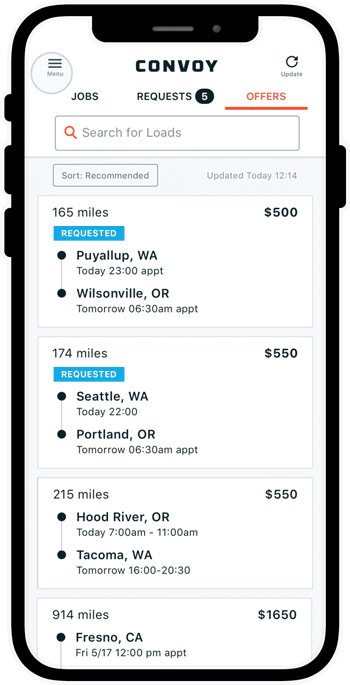Watch all the Transform 2020 sessions on-demand here.
On-demand trucking and freight marketplace Convoy has raised $400 million in a series D round of funding co-led by Generation Investment Management and T. Rowe Price Associates, with participation from Alphabet’s CapitalG, Lone Pine Capital, Baillie Gifford, Fidelity Management and Research, and Durable Capital Partners.
The Seattle-based company has raised a chunky $668 million since its inception in 2015 and now claims a post-money valuation of $2.75 billion. Its latest cash injection follows a $185 million series C round led by CapitalG last September, which elevated it to the much-coveted “unicorn” club with a valuation north of $1 billion. Other illustrious previous investors include Salesforce CEO Marc Benioff, Dropbox CEO Drew Houston, Instagram cofounder Kevin Systrom, Jeff Bezos’ Bezos Expeditions, Y Combinator, Greylock Partners, and — because why not — Bono and The Edge from U2.
By way of a quick recap, Convoy connects shippers with carriers, matching supply with demand to ensure trucks aren’t traveling long distances with empty trailers. It’s all about optimizing and streamlining cargo loads — like Uber for trucks. In fact, Uber itself offers a similar service called Uber Freight, which it recently committed another $200 million to as part of a major expansion.
Countless other trucking startups have raked in big venture capital (VC) bucks — San Francisco-based KeepTruckin recently secured $149 million in funding from a host of big-name investors, including Alphabet’s other investment arm GV, while Next Trucking closed a $97 million investment.
June 5th: The AI Audit in NYC
Join us next week in NYC to engage with top executive leaders, delving into strategies for auditing AI models to ensure fairness, optimal performance, and ethical compliance across diverse organizations. Secure your attendance for this exclusive invite-only event.
The reason for this road freight tech boom is simple — the trucking industry generated around $800 billion in revenue in the U.S. alone last year, according to recent figures from the American Trucking Associations — a number that represents more than 80% of the country’s total freight bill.
“We built this company from the beginning with a focus on creating a more efficient model for connecting shippers and truckers,” explained Convoy CEO and cofounder Dan Lewis. “Trucking has historically been a zero-sum game, born from a marketplace where when one side wins, the other side loses. The magic of applying technology to this decades-old industry is that we can create a true win-win for both sides, lowering the total cost to shippers with better service while removing the hassle of wasted time and miles for truck drivers, allowing them to earn more.”
Automation
Machine learning (ML) plays a pivotal role in Convoy’s pitch — rather than relying on humans to match freight loads with trucks, the company announced earlier this year that 100% of the process is now automated in some of its biggest markets. This means that when a driver searches for a new load through the Convo app, they will be paired with the most suitable options. Moreover, Convoy’s ML smarts improve with each load as it learns from carrier behavior.
Additionally, ML plays a big role in pricing, though both parties must agree on a rate once they’ve been matched. Based on the load, route, and so on, Convoy automatically suggests a price, though carriers can counter this with a bid if they think the rate is too low.

Above: Convoy’s carrier app
Convoy’s new gargantuan funding round will further the company’s goal of removing inefficiencies and automating processes that have historically consumed a lot of resources. This includes the recently launched Convoy Go service, a “drop-and-hook” marketplace that matches preloaded trailers with Convoy’s transport network infrastructure, reducing wait times for collecting a new load by up to two-thirds.
It’s a similar story elsewhere in the truck-tech sphere, with Uber Freight leaning heavily on machine learning as part of its offering, while upstarts such as Locus are pushing to automate logistics with supply chain platforms that help shippers optimize route planning.
Green machine
Another benefit of Convoy’s platform is helping shippers and carriers avoid “empty miles,” which can take a toll on the environment.
“Building a more efficient digital freight network also means we can dramatically reduce carbon emissions associated with empty miles, which is good for the planet,” Lewis said.
This has been a key theme to emerge across the technology industry, with the likes of Apple and Google increasingly touting their green credentials. On-demand transport giant Uber is pushing for more electric vehicles in some of its key locations, and it recently committed to powering each of its offices with renewable energy by 2025.
According to the U.S. Environmental Protection Agency (EPA), mid-weight and heavy-duty trucks accounted for 23% of all transport-based greenhouse gas emissions in 2017. And an American Transport Research Institute (ATRI) report on the operational costs of trucking found that of the 9.4 billion miles traversed annually, 20.7% involved empty loads, thought other reports — including research carried out by Convoy itself — place this figure at closer to a third.
Whatever the true figure, Convoy’s “empty mile” solution is clearly appealing to investors with commitments to both profit and ethics.
“Generation’s investment in Convoy is grounded in many years of research into the future of logistics,” said Generation Investment Management partner Joy Tuffield. “Through its use of data science, Convoy is driving the next evolution in efficiency across the industry. This is an exceptional opportunity to achieve a reduction in carbon emissions while simultaneously increasing earnings for truck drivers and increasing service quality for shippers.”


